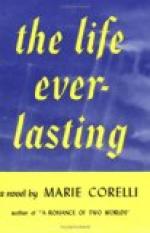“And”—here Mr. Harland hesitated, then went on—“Are you married?”
Santoris lifted his eyes and regarded his former college acquaintance fixedly.
“That question is unnecessary”—he said—“You know I am not.”
There was a brief awkward pause. Dr. Brayle looked up with a satirical smile.
“Spiritual science has probably taught you to beware of the fair sex”—he said.
“I do not entirely understand you”—answered Santoris, coldly—“But if you mean that I am not a lover of women in the plural you are right.”
“Perhaps of the one woman—the one rare pearl in the deep sea”— hinted Dr. Brayle, unabashed.
“Come, you are getting too personal, Brayle,” interrupted Mr. Harland, quickly, and with asperity—“Santoris, your health!”
He raised a glass of wine to his lips—Santoris did the same—and this simple courtesy between the two principals in the conversation had the effect of putting their subordinate in his proper place.
“It seems superfluous to wish health to Mr. Santoris,” said Catherine then—“He evidently has it in perfection.”
Santoris looked at her with kindly interest.
“Health is a law, Miss Harland”—he said—“It is our own fault if we trespass against it.”
“Ah, you say that because you are well and strong,” she answered, in a plaintive tone—“But if you were afflicted and suffering you would take a different view of illness.”
He smiled, somewhat compassionately.
“I think not,”—he said—“If I were afflicted and suffering, as you say, I should know that by my own neglect, thoughtlessness, carelessness or selfishness I had injured my organisation mentally and physically, and that, therefore, the penalty demanded was just and reasonable.”
“Surely you do not maintain that a man is responsible for his own ailments?” said Mr. Harland—“That would be too far-fetched, even for you! Why, as a matter of fact a wretched human being is not only cursed with his own poisoned blood but with the poisoned blood of his forefathers, and, according to the latest medical science, the very air and water swarm with germs of death for the unsuspecting victim.”
“Or germs of life!” said Santoris, quietly—“According to my knowledge or ‘theory,’ as you prefer to call it, there are no germs of actual death. There are germs which disintegrate effete forms of matter merely to allow the forces of life to rebuild them again—and these may propagate in the human system if it so happens that the human system is prepared to receive them. Their devastating process is called disease, but they never begin their work till the being they attack has either wasted a vital opportunity or neglected a vital necessity. Far more numerous are the beneficial germs of revivifying and creative power—and if these find place, they are bound to conquer those whose agency is destructive. It all depends on the soil and pasture you offer them. Evil thoughts make evil blood, and in evil blood disease germinates and flourishes. Pure thoughts make pure blood and rebuild the cells of health and vitality. I grant you there is such a thing as inherited disease, but this could be prevented in a great measure by making the marriage of diseased persons a criminal offence,—while much of it could be driven out by proper care in childhood. Unfortunately, the proper care is seldom given.”




